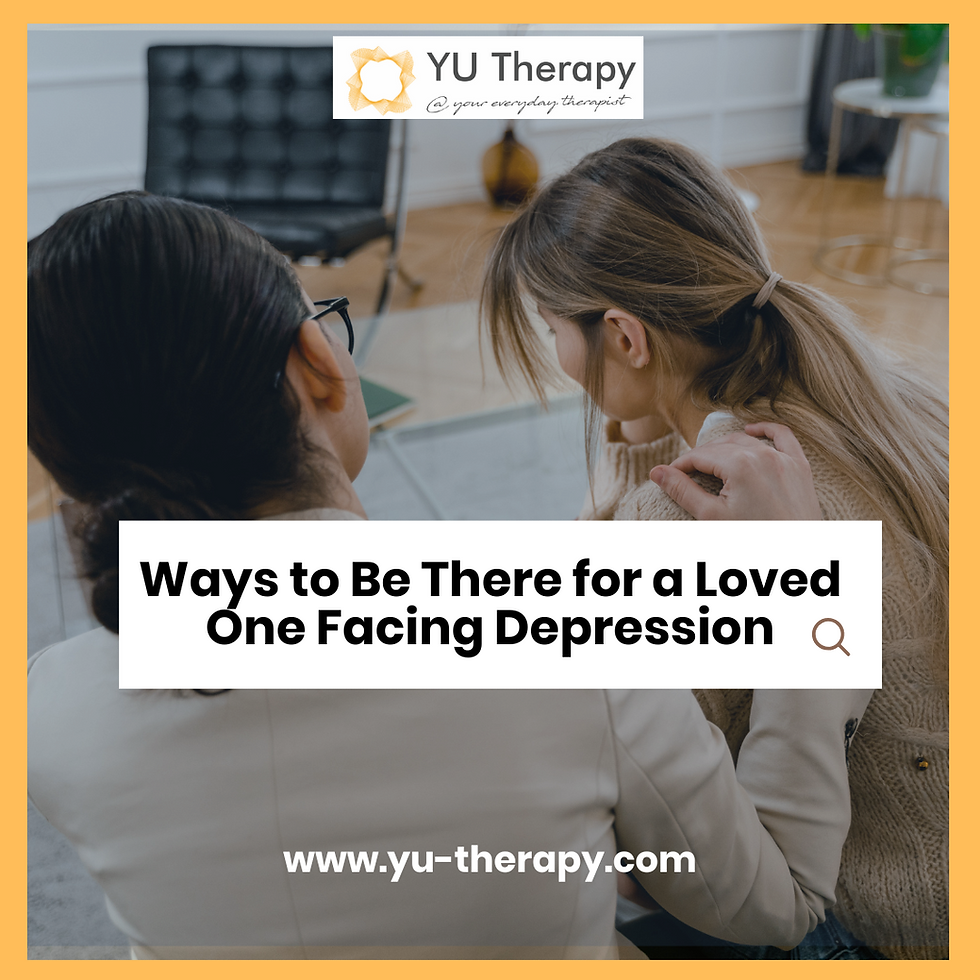What Happens in a Clinical Hypnotherapy Session?
- Yu Therapy

- Jul 11
- 4 min read
Updated: Aug 18

Clinical hypnotherapy is gaining recognition as an effective, holistic approach for emotional, psychological, and behavioural well-being. Whether you're exploring it for anxiety, confidence issues, or as a treatment for depression, understanding what to expect during a clinical hypnotherapy session can help you feel more at ease with the process.
Our Approach at Yu Therapy:
What Happens Before the Session Begins
Book Your Initial Consultation You can easily book your first session online, by WhatsApp, or by giving us a call.
Complete a Short Registration Form Once your booking is confirmed, we’ll send you a simple form to fill in. This helps your therapist get to know a little about you: your main concerns, what you’re hoping for, and any health or medical details we should be aware of.
Prepare for a Calm Start There’s nothing you need to study or prepare in detail. Just come as you are. We do the rest - helping you feel safe, understood, and ready to talk things through at your own pace.
What happens in a session
1. Talk Therapy to Build Trust and Clarity
Every clinical hypnotherapy session starts with counselling. This is where you get to share what’s weighing on your mind, what changes you hope for, and any worries about the process. Your hypnotherapist will ask about the main issue you want help with, your goals for therapy, and how anxiety, low mood, or stress affects your daily life. We take time to really listen. Unlike short counselling sessions that might be 45 minutes, we often spend about an hour and a half together. This gives us time to understand you fully and build trust.
Kindly note that we do not do formal diagnosis or give medication - that’s the job of your psychiatrist or clinical psychologist. Instead, we focus on listening and guiding you gently through talk therapy and hypnosis. Hypnotherapy is a good complementary therapy for people who are already under psychiatric care or taking medication. We often work closely with psychiatrists, clinical psychologists, and GPs so you get care that feels safe and complete.
2. Understanding How Hypnotherapy Works
Once we understand what you want help with, we explain how hypnotherapy works. We’ll share what trance feels like, how suggestions are given, and remind you that you stay fully aware and in control.
There is no stage trick, swinging of pendulums or loss of control. Hypnosis is simply a gentle, focused state that helps your mind accept positive ideas and let go of old stuck patterns.
3. Induction: Entering the Trance State
The session begins with what is called an “induction.” This is a gentle method that guides your mind into a state of deep relaxation, often compared to the few moments before falling asleep or the calmness you feel while daydreaming. Most people say it feels like drifting off before sleep or daydreaming.
During this time, your body becomes physically relaxed while your mind becomes more focused and receptive. For many clients, this is the most surprising part, noticing how quickly and effortlessly they begin to feel calm, safe, and centred.
4. Therapeutic Work: Addressing the Core Issue
Once you are in a state of trance, the hypnotherapist uses carefully structured language and imagery to help address your issue. These suggestions are based on your earlier conversation and tailored to how your mind works.
For instance, if you're seeking therapy for depression, the hypnotherapist might work on reshaping inner narratives, reducing negative self-talk, or helping you reconnect with a sense of purpose and motivation.
In some sessions, past memories may surface, offering insight or resolution. In others, metaphors or visualisations are used to shift emotional patterns. Every session is customised to support your healing in a way that feels safe and supportive.
5. Returning to Awareness: Integration and Grounding
Once the therapeutic part of the session is complete, the hypnotherapist gently guides you back to full awareness. Most clients report feeling refreshed, calm, and often surprised by how much time has passed.
At this point, you will have a chance to talk about your experience, ask questions, and receive suggestions for what to notice or practice in the days ahead. Sometimes, you may be given simple tools or affirmations to reinforce the work done during the session.
What happens after the session
Take time to notice how you feel. Many people feel subtle changes in their moods and body the few days after hypnosis. Your therapist may give you some homework, like small practices to help you keep the good work going between sessions. This might include affirmations, short breathing exercises, or reminders to notice small changes. You can then schedule to come back for therapy after 1-2 weeks. Therapy takes time and is not a one-session approach. Each session builds on the last, helping you feel safer, clearer and more supported as you move forward. We believe therapy works best at your pace- not rushed, not endless, just steady and supportive.





Comments